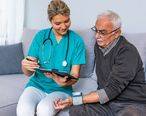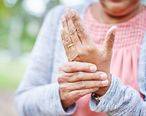Understanding Cancer Risks in Older Adults
A cancer diagnosis at any age is challenging. But a cancer diagnosis in older adults can be particularly devastating. Frailty and other common health conditions such as heart disease and diabetes can complicate cancer treatment. What’s more, older adults may have social, emotional, and financial challenges that undermine their ability to seek care and treatment.

A cancer diagnosis at any age is challenging. But a cancer diagnosis in older adults can be particularly devastating. Frailty and other common health conditions such as heart disease and diabetes can complicate cancer treatment. What’s more, older adults may have social, emotional, and financial challenges that undermine their ability to seek care and treatment.
The great news is that cancer treatment can be every bit as effective in older adults as it is in young people. The key to good outcomes starts with understanding your cancer risk and treatment plan options. Here’s what you need to know about cancer in older adults.
What are Common Cancers for Older Adults?
Research has shown that older adults are more at risk for certain cancers, such as breast cancer, prostate cancer, colon cancer, lung cancer, and bladder cancer. Understanding these cancer risks can help you be on the lookout for any signs of the disease. Screenings can help diagnose these cancers in the early stages, when they are most treatable.
In the case of breast cancer for women, yearly mammograms can detect early-stage cancers so treatment can prevent spread of the disease. Prostate cancer, diagnosed in 250,000 men in 2020, can be detected through a simple blood test. A colonoscopy can detect precancerous growths in the colon. And a CT scan can check for signs of lung cancer.
To give yourself the best chance of a good cancer outcome, keep up with your routine medical exams and cancer screenings, pay attention to changes in your body, and let your doctor know if something feels different. Even simple things like needing to get up at night to use the bathroom, changes in your appetite, or new pain are worth investigating.
Some common symptoms of cancer to be aware of include:
-
Unexplained weight loss
-
Fatigue
-
Night sweats
-
Loss of appetite
-
New, persistent pain
-
Recurrent nausea or vomiting
-
Blood in urine
-
Blood in stool
Does Cancer Risk Increase After Age 6 5 ?
As with many other illnesses, cancer risk can increase as we age. This can be a result of our environment and lifestyle choices associated with the development of the disease. More than half of cancer diagnoses are seen in people over 65. Your chance of a cancer diagnosis over your lifetime is 44% for men and 38% for women. But that percentage goes up after age 65. According to Johns Hopkins Medicine, the average age for a cancer diagnosis is 68.
There are some biological reasons cancer risks rise with age. It turns out that aging bodies have a more difficult time with DNA repair. The ability of the body to repair damaged DNA is crucial to keeping cancer at bay. Yet as we age, our body produces more damaged cells, in which proteins and DNA have deteriorated. Senescence, a process that halts the growth of damaged cells and DNA, is also less effective in older people, leading to the uncontrolled cell division that can cause or spread cancer.
Can Ageism Affect My Quality of Treatment?
Ageism, which is prejudice or discrimination against people based on their age, is a problem in healthcare. As many as 82% of older Americans say they experience ageism regularly. It can harm both their physical and mental health. For older adults seeking medical care for cancer, ageism can occur if a doctor ignores or downplays symptoms, assuming they are part of the normal aging process.
A 2017 study reported that social workers in healthcare spent less time with older people diagnosed with cancer, and doctors were less patient, less respectful, and less involved with the care of their older cancer patients. In the case of cancer specifically, ageism can result in:
-
Being offered fewer tests, such as biopsies
-
Receiving milder treatments or no treatment at all
-
Not being asked to join cancer clinical trials
A delayed cancer diagnosis due to ageism can have devastating healthcare outcomes. Signs of ageism to look for can include a doctor who lacks patience, seems disengaged, is unresponsive, doesn’t explain details of an illness, or talks down to you in a condescending way (baby talk or “elderspeak”). It’s been shown that older adults who have experienced ageism in healthcare are less likely to seek medical assistance and, as a result, lose out on valuable treatment, like preventative screenings that could identify cancer in the early stages.
Treatment Risks Need to Be Weighed
Many adults over the age of 65 have been diagnosed with cancer. Most cancer survivors are older than 65, proving that cancer treatment can help older adults just as much as younger ones. While medication and such procedures as radiation therapy and chemotherapy can be difficult for some older adults to tolerate, treatment can be done at any age. Your doctor will want to evaluate your overall health, including any preexisting conditions and medications you are taking.
According to the American Society of Clinical Oncology (ASCO), knowing your desired outcome is crucial to navigating your cancer treatment decisions. Some questions to consider include:
-
Is your goal to be cancer-free?
-
Is it more important to prolong your life, even if that means living with cancer?
-
Do you want to have fewer symptoms from cancer?
-
Are you looking to avoid side effects from treatment?
-
Do you want to maintain your physical and emotional health?
Find Age-Friendly Care Where You Live
Age-friendly Health Care is care that addresses your unique needs and wants. It can help you
enjoy a better quality of life with the care that is safe and based on what research shows are the most important things to pay attention to as we get older, the 4Ms for healthy aging: what Matters most to you, the Medication you take and how it impacts your wellbeing, Mentation (that’s your mood and memory) and your Mobility, which is so crucial for maintaining your health and independence.
Did you know that more and more health systems are offering Age-Friendly Care? Learn about Age-Friendly Health Care and where you can find it at AgeFriendly.org.
THIS ARTICLE DOES NOT PROVIDE MEDICAL ADVICE. It is intended for informational purposes only. It is not a substitute for professional medical advice, diagnosis or treatment. Never ignore professional medical advice in seeking treatment because of something you have read on the site. If you think you may have a medical emergency, immediately call your doctor or dial 911.















There are no comments for this article yet. Be the first to leave a comment